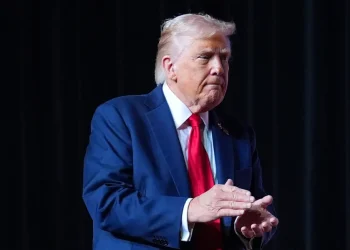Unlock the White House Watch newsletter for free
Your guide to what Trump’s second term means for Washington, business and the world
China has criticized Donald Trump’s plan to impose additional 100% tariffs on Chinese exports and threatened further countermeasures, blaming the United States for a rapid deterioration in relations between the world’s two largest economies.
In a statement, the Commerce Department said that since trade talks between the two countries in Madrid last month, the United States had “continuously introduced a series of new restrictions against China,” including placing Chinese companies on a trade blacklist.
“China’s position on the tariff wars has been consistent: we do not want to fight, but we are not afraid to fight,” the ministry said on Sunday.
In the latest escalation of the trade war between the two countries, the US president said on Friday he would impose “large-scale” export controls on “virtually every product they make”, including “all critical software”, alongside the new tariffs. The new measures will be imposed no later than November 1, according to a post from Trump on social media.
“Threatening to impose high tariffs at every turn is not the right way to engage with China,” the Commerce Ministry said. “If the United States persists on this path, China will resolutely take corresponding measures to safeguard its legitimate rights and interests. »
Trump’s threat follows a series of trade moves by China over the past two days that expanded its export controls on rare earths and related technologies, as well as equipment and materials for manufacturing batteries.
Beijing also launched an antitrust investigation against U.S. chipmaker Qualcomm and imposed fees on U.S. ships docking in Chinese ports.
Beijing’s actions this week appear to be a strategy to gain leverage ahead of an expected face-to-face meeting between Trump and Xi in South Korea. On Friday, Trump expressed doubt that the meeting would take place, but then said they would likely meet.
China’s new export controls have sparked fears of widespread disruption in the global manufacturing industry.
Beijing said on Sunday the impact on supply chains would be “extremely limited” and insisted businesses “need not worry”, saying any applications for civilian use that comply with the regulations would be approved.
The Commerce Ministry added that the US side had long “abused export controls” and overstepped the concept of national security.
Trump’s statement, released via his social media platform Truth Social, raises the prospect of an end to détente in the trade war between the United States and China since the truce reached in Geneva in May.
Before that, a near trade embargo loomed between the two countries after Trump imposed 145 percent tariffs on Beijing and Xi retaliated with 125 percent levies on goods from the United States.
Feng Chucheng, founding partner of Hutong Research, an independent consultancy based in Beijing, said that following the Madrid talks, the two sides appeared to be aligned to avoid escalation ahead of the proposed meeting between Xi and Trump in late October.
However, that changed after the U.S. decision in September to tighten export controls on Chinese companies, to make it harder to circumvent rules intended to slow China’s ability to develop advanced semiconductors.
Beijing also opposed Washington’s decision to raise fees for Chinese-built ships visiting U.S. ports.
“From Xi’s perspective, these actions constitute not only a substantial escalation, but also further confirmation of the Trump administration’s low credibility,” Feng said.
He said Beijing was reactivating a strategy used after Trump’s initial tariffs in April, “raising tariffs first to force a reset of negotiations, rather than passively waiting for the next negotiations.”
The White House, the U.S. Trade Representative and the Treasury did not immediately respond to requests for comment.
Yanmei Xie, a senior research associate at the Mercator Institute of China Studies, said that while the United States has trade leverage and both countries are exposed to other countries’ export controls, China may have “the upper hand” when it comes to business sector vulnerabilities.
“There are many more American companies producing in China than the other way around, and some of them, like Apple and Tesla, are the jewel of American companies,” she said.
Cory Combs, managing partner at Beijing-based consultancy Trivium China, said Trump’s latest escalation, including threatening to walk away from negotiations with Xi, could trigger a recalibration by Beijing.
“In reality, I think Beijing is quickly adjusting its approach — and maybe leaders don’t even know exactly what the next step is,” he said.
Additional contributions from Wang Xueqiao in Shanghai









